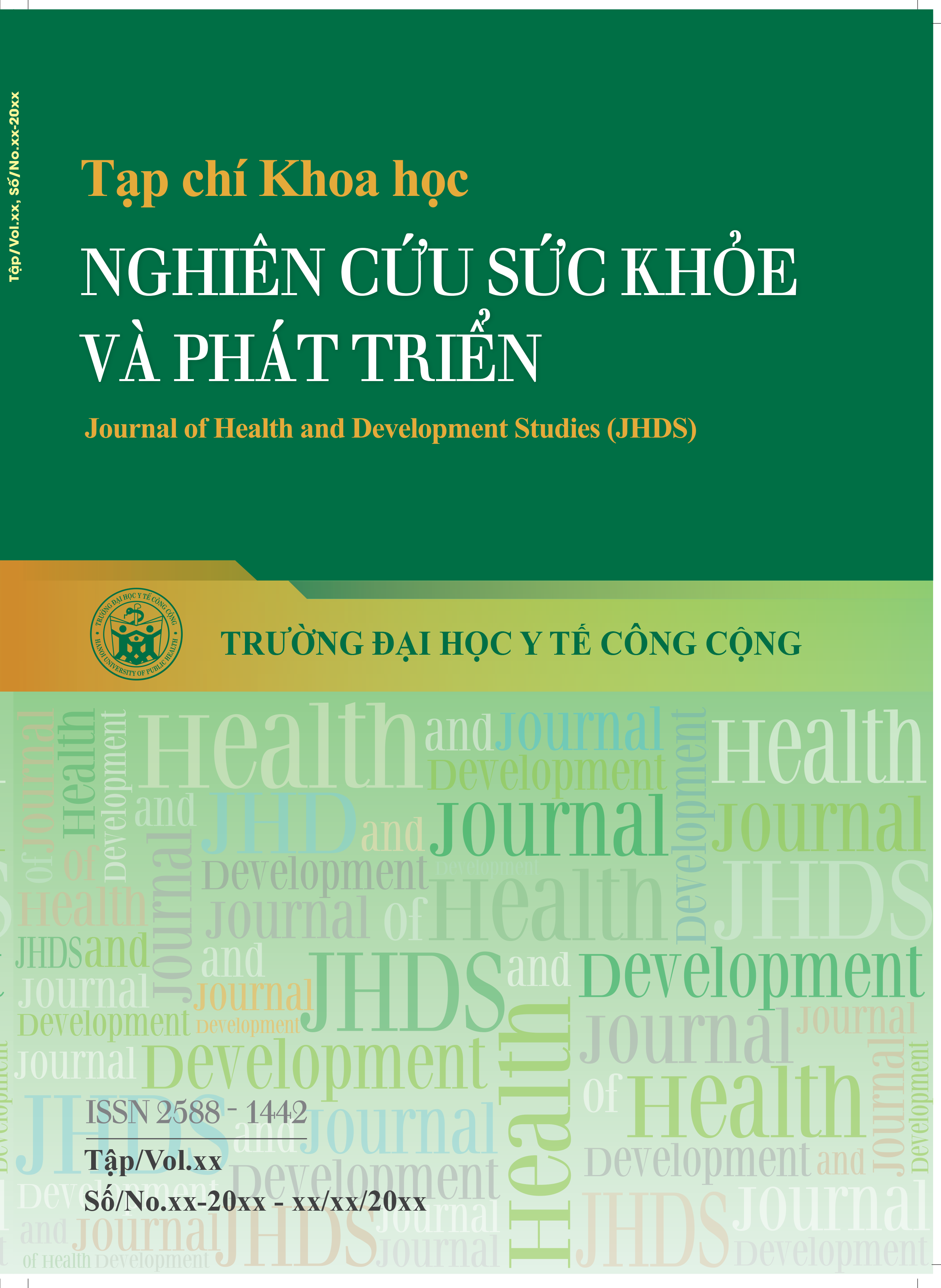Tạp chí
Khoa học Nghiên cứu Sức khỏe và Phát triển
(Journal of Health and Development Studies – JHDS)
Trường Đại học Y tế công cộng
ISSN (Print): 2588-1442
ISSN (Online): XXXX-XXXX
https://jhds.edu.vn
The care needs of dementia patients in Nam Dong District, Thua Thien Hue Province: An observational study using the Camberwell Assessment of Need for the Elderly questionnaire
- Mã bài báo : SKPT_23_011
- Ngày xuất bản : 30/08/2023
- Số trang : 147-154
- Tác giả : Nguyen Hoang Thuy Linh
- Lượt xem : ( 509 )
Danh sách tác giả (*)
- Nguyen Hoang Thuy Linh 1 - Hue University of Medicine and Pharmacy, Hue University
- Dang Cao Khoa 1 - Faculty of Public Health, University of Medicine and Pharmacy, Hue University
- Nguyen Thi Dang Thu 2 - Hue University of Medicine and Pharmacy, Hue University
- Vo Nu Hong Duc 3 - Faculty of Public Health, University of Medicine and Pharmacy, Hue University
- Tran Binh Thang 4 - Hue University of Medicine and Pharmacy, Hue University
- Doan Vuong Diem Khanh - Hue University of Medicine and Pharmacy, Hue University
Objectives: This study aimed to describe the care needs among dementia patients in Nam Dong District, Thua Thien Hue Province by using the Camberwell Assessment of Need for the Elderly (CANE) questionnaire, and to examine its related factors.
Methods: A cross-sectional descriptive study was conducted on 182 dementia patients living in Nam Dong District, Thua Thien Hue Province. The care needs of dementia patients were examined by using the CANE questionnaire (score range: 0-30). The CANE has shown a good level of reliability (α = 0.87). The multivariate linear regression analysis was undertaken to explore the associated factors of the care needs among dementia patients.
Results: The mean score of the subjects' needs was 8.21 ± 7.99 (Min: 0; Max: 30). Met needs were reported most commonly in the following areas: food (34.1%), drugs (29.7%), physical health (25.3%) and looking after the home (24.7%). Meanwhile, unmet needs with the highest proportions included accommodation (30.2%), memory (24.7%), money/budget (24.2%), and information regarding health conditions and treatment (18.1%). Higher health care needs were significantly related to Co Tu ethnic group; unmarried group (including single; widowed; divorced/separated); poor, near-poor household economic status group.
Conclusions: Unmet needs are common among dementia patients. Primary health care providers should work with carers to promote social support services as well as health care services that meet all needs of dementia patients and improve their quality of life.
- DOI : https://doi.org/10.38148/JHDS.0704SKPT23-011
- Chủ đề : Mô hình sức khỏe, ốm đau, bệnh tật, chất lượng cuộc sống
- Loại bài báo : Nghiên cứu gốc
- Chuyên nghành : Chuyên Ngành Y
Bài báo liên quan
- The care needs of dementia patients in Nam Dong District, Thua Thien Hue Province: An observational study using the Camberwell Assessment of Need for the Elderly questionnaire
- Preventive Measures Against Monkeypox: A Scoping Review
- How KoboToolbox versus Unipark platform are selected in data survey to detect child maltreatment in Vietnam: A discussion paper
- Respiratory function of workers at some wood factories in Bac Tu Liem district, 2022
- Mental health of people with and without disabilities in Vietnam during the COVID-19 pandemic
- Cause-specific mortality in A6 death registration system: results from a population-based study in Hanoi 2017, Vietnam
- Stress situation and associated factors among nursre in clinical departments at Sa Dec General Hospital, Dong Thap province, in 2021
- Short-term effects of air pollution on respiratory hospitalizations in Ha Nam, during 2018-2020
- Quality of life of type 2 diabetes outpatients and the associated factors: A cross-sectional study at Ha Dong General Hospital in 2020
- Perception of patient safety and associated factors among health staff: A cross-sectional study in some hospitals in Vietnam
- Applying tools to support human resource management in HIV/AIDS prevention and control in 7 provinces: Initial results on the appropriateness and scalability
- Stress of the mothers in caring for children with developmental disabilities and some related factors
- Stress among nurses and associated factors during the COVID-19 pandemic in Hanoi, Vietnam, in 2022
- Drinking water quality and associated factors at water supply stations in Quang Ngai Province in 2022
- Association between retinol intake and risk of gastric cancer: a case-control study in a Korean population
- Compliance with National guidelines for antibiotic prophylaxis use in surgery: A case study in Thu Duc City Hospital, South of Vietnam
- Economic, Social, and Mental Health Difficulties Among High School Students in Hanoi During the COVID-19 Lockdown Period
Bài viết mới nhất
- Một số trang web hữu ích đối với các nhà khoa học
- Dành cho chuyên gia
- Tạp chí Khoa học Nghiên cứu sức khỏe và Phát triển duyệt tối đa 1,0 điểm ngành Y trong Danh mục Tạp chí khoa học được tính điểm của Hội đồng giáo sư Nhà nước
- CHÚC MỪNG NGÀY BÁO CHÍ CÁCH MẠNG VIỆT NAM (21/6)
- GS.TS Hoàng Văn Minh - Hiệu trưởng Nhà trường 'lọt top' nhà khoa học có chỉ số trích dẫn hàng đầu thế giới

 File toàn văn
File toàn văn Thông tin liên hệ :
Thông tin liên hệ : Email :
Email : Địa chỉ :
Địa chỉ :